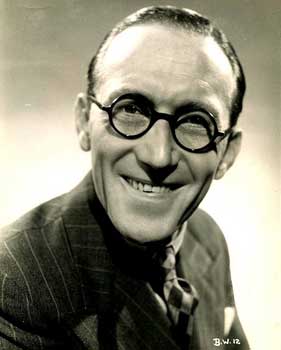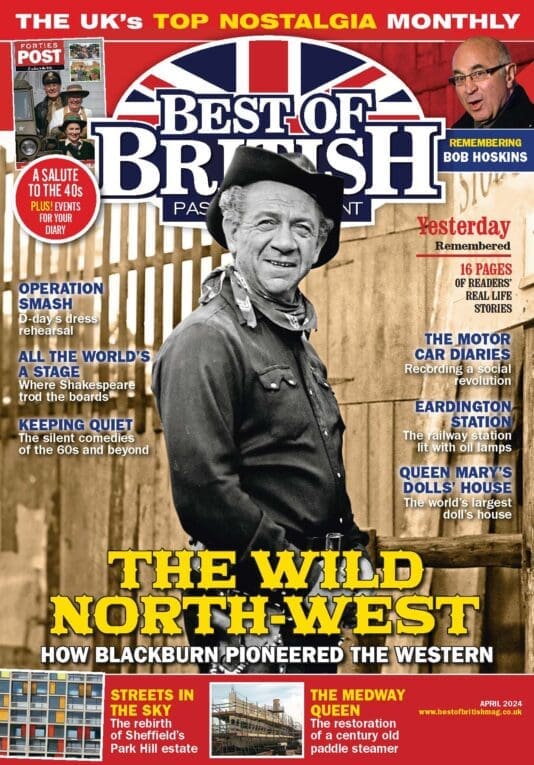The diminutive Army lad who became a giant of British comedy

Arthur Askey was only five feet two in his stocking feet, but his enormous talent for entertaining people was evident from when he was a boy.
He hailed from the famous Liverpool humour stable that produced such legendary performers as Ken Dodd, Rob Wilton, Ted Ray, and Tommy Handley. Born in 1900 in Moses Street (not the bulrushes, as he would point out), he soon became the street comedian, singing funny songs at kids’ Sunday school parties and juvenile amateur shows. He also had a serious side to him and sang in the cathedral choir, prompting him to consider a concert career as a tenor.
Enjoy more Best of British Magazine reading every month.
Click here to subscribe & save.
Always a great master of the ad-lib and bubbling over with confidence in his ability to make people laugh, he joined the Army at 18 as WWI was reaching its conclusion. It soon became obvious that he was best employed keeping up morale at troop concert parties.
After service, he worked in a city office but joined a local semi-professional concert party. Before the days of the wireless, these popular entertainers were in great demand. They usually consisted of a male and female vocalist, instrumentalist such as accordionist, pianist and one-string fiddle, or musical saw player. The baritone was a chap called Tommy Handley, who turned professional as a chorus singer in the touring Maid of the Mountains musical comedy. Arthur soon followed, being taken on as a pierrot in a seaside beach and end of pier show. These entertainers were jacks of all trades, playing various roles and going round the audience with a collection box. The boss would tell his troupe: “If someone is asleep in a deckchair, rattle the box to wake him up!”
For several years, Arthur honed his comedy skills in these traditional seaside entertainments alongside future stars, one of whom was Webster Booth, the famous tenor. He later progressed to gentlemen’s smoking evenings and Masonics, but life could be very trying for a struggling comic and Arthur came in for his share of catcalls and disinterested audiences.
Although considered one of the top seaside entertainers, Arthur’s rise to stardom was destined to be through the wireless. Teaming up with Richard ‘Stinker’ Murdoch in 1938, he starred in the first ever radio sitcom, Band Waggon, the pair supposedly living in a flat over Broadcasting House. After a shaky start, the show became a huge success and every week they received mail from listeners addressed to them in the flat.
They followed the show up with a variety tour playing to packed houses wherever they went. The 1940 film Band Waggon established the pair as film stars, followed by several wartime comedy films with Gainsborough Pictures including Charley’s Big Hearted Aunt (1940), I Thank You (1941), King Arthur was a Gentleman and Back Room Boy (both in 1942), and Miss London Ltd (1943). Their most famous film, The Ghost Train (1941), was written by struggling actor Arthur Ridley, who later, as an elderly actor, found fame in Dad’s Army as bumbling Private Godfrey.
The failure of his 1944 film Bees in Paradise was a body blow to Arthur, who up till then had the critics on his side. He decided to retire from the screen and concentrate on establishing himself as a solo variety act. It is difficult to describe how funny Arthur was in the flesh. For those who didn’t see him on stage imagine the pit orchestra striking up with the Bee Song, his signature tune, seconds later, an elfin-like little man in horn-rimmed spectacles and comical hat almost flies onto the stage waving his arms like the vanes of a gale-driven windmill threatening at any moment to take off and fly to the gallery and still gyrating, bursts into song:
Oh, what a wonderful thing to be,
A healthy grown-up busy, busy bee;
Whiling away all the passing hours
Pinching all the pollen from the cauliflowers,
I’d like to be a busy little bee
Being as busy as a bee can be,
Flying around the garden brightest ever seen
Taking back the honey to the dear old queen
Bz bz bz bz honey bee, honey bee
Buzz if you like but don’t sting me!…
He would then greet his audience with: ‘Hello playmates!’ In between his quick fire zany patter he’d slip in his catchphrases, which became part of normal conversation: ‘Doesn’t it make you spit!’ and ‘Before your very eyes!’ His most famous was ‘I thank you’, pronounced ‘Ay thang yew!’
Big-hearted Arthur was one of nature’s irrepressible, the schoolboy who never grew up, popular with audiences of all ages. He was an absolute hoot as Big-Hearted Martha, the pantomime dame.
In 1955, Arthur successfully returned to the silver screen after a long absence in The Love Match, followed the next year by Ramsbottom Rides Again – to my mind, one of the funniest films I have ever seen. Then there was Make Mine a Million and Friends and Neighbours, before his final film, Rosie Dixon – Night Nurse, in 1978.
From the early 1950s, Arthur had taken to television like the proverbial duck to water, making several sitcoms that he later toured on the theatre circuit, sometimes with his actress daughter, Anthea. The first was Before Your Very Eyes, in 1952. Others included The Arthur Askey Show, Love and Kisses and Arthur’s Treasured Volumes. He also appeared in the comedy panel game Joker’s Wild, and was a judge in the talent show New Faces, doing his best to encourage contestants who often received a slating from Mickie Most and Tony Hatch. Obviously a fish out of water with regard to pop music, Arthur – who couldn’t have been serious if he tried – turned on the comedy to the frustration of the other deadly serious judges. I remember him referring to Jerry and the
Pacemakers as Fred Pace and the Jerry Makers, a ‘jerry’ being a slang word for a chamber pot!
Arthur suffered badly with circulatory problems and as he got older the condition became so critical that he had both legs amputated. He died in 1982, mourned by the nation.
In days long gone, Arthur Askey would have been a jester to the king. In my book, Arthur was the king – the King of Comedy!
John Vose
This article appeared in the August 2009 issue of Best of British.

